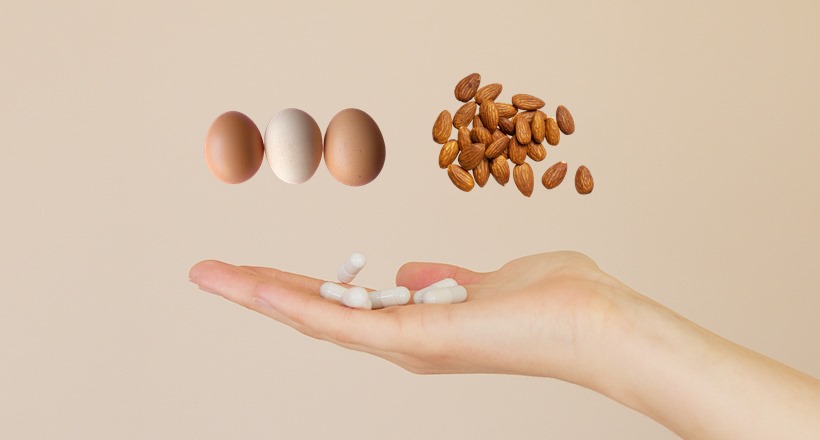Biotin is the go-to supplement for those wanting to improve their hair, skin, and nails. But when is the best time to take it?
Experts say there’s no specific time that’s best. You can take biotin any time of day, with or without food. This makes it easy to fit into your daily schedule.
Consistency is important, though. Set a pattern and stick to it. That will help you get the most out of biotin.
If you’re taking biotin for a specific purpose, like hair growth or stronger nails, it’s worth talking to a healthcare professional. They can give tailored advice and help you decide the right dosage and frequency for you.
Table of Contents
What is Biotin?
Biotin, also known as Vitamin B7 or H, is a water-soluble nutrient that’s great for your overall health. It’s found in foods such as eggs, nuts, and leafy green veggies. This vitamin helps your body metabolize fats, proteins, and carbs. A deficiency of this essential vitamin can lead to various medical issues and affect people of all ages.

It can help strengthen nails, promote hair growth, and improve skin texture. Plus, it also supports enzymes that break down macronutrients into energy.
Fun fact: Biotin is linked to keratin production. Keratin’s a protein that’s part of hair, nails, and skin. It helps make more keratin, which leads to healthier hair and nails.
So, if you want Rapunzel-like locks and strong nails, get your biotin fix!
Importance of Biotin for Hair and Nail Health
Biotin deficiency can manifest as brittle nails, hair loss, fatigue, and skin problems.

Here’s why biotin is important:
- It boosts hair growth. Biotin helps make keratin, the protein that forms hair and nails. Having enough biotin can give you luscious locks.
- It strengthens weak nails. Nail fragility can mean a biotin shortage. Adding it to your routine can improve nail structure and stop breakages.
- It boosts hair and nail health. Biotin doesn’t just help growth – it improves texture, thickness, and overall condition.
Remember, biotin is water-soluble and can leave the body quickly. So, you need to keep taking it for hair and nail benefits. Incorporating hair vitamins into your daily routine ensures a steady supply of essential nutrients needed for strong and vibrant hair.
Consider taking biotin supplements, or eating biotin-rich foods like eggs, nuts, seeds, and greens.
Finding the right dosage is like finding the perfect condiment level for your sandwich – too little and it’s dull, too much and it’s a disaster!
Recommended Dosage of Biotin
Biotin dosage should be taken as per recommended guidelines to ensure its maximum effectiveness. Here are the key points to consider:
- Starting Dosage: Begin with a low dosage, typically around 30 micrograms.
- Recommended Daily Intake: The ideal dosage for most adults is between 30 to 100 micrograms.
- Higher Dosage: If prescribed by a healthcare professional, the dosage may be increased to 300 micrograms.
It is important to note that individual needs may vary, and consulting with a healthcare provider is advised.
To enhance the absorption of biotin, consider taking it alongside a meal that contains a small amount of healthy fats.
Remember, proper dosage and regular use of biotin can ensure its effectiveness in promoting hair, skin, and nail health. If you’ve had more hair-raising experiences than Rapunzel, it might be time to up your daily biotin dose.
Daily Recommended Intake of Biotin
Biotin is essential for keeping your hair, skin, and nails healthy. It also helps with fat, carbohydrate, and protein metabolism. A table below shows the recommended intake for different age groups:
| Age Group | Recommended Intake |
|---|---|
| Infants | 5-6 mcg |
| Children | 25-35 mcg |
| Adults | 30-70 mcg |
| Pregnant Women | 30-70 mcg |
| Breastfeeding Women | 35-70 mcg |
Biotin also boosts cognitive function and supports the nervous system. You can find it in foods like eggs, nuts, seeds, and certain veggies.
Dr. Paul Gyorgy was the first to discover biotin in the early 20th century. His research uncovered its importance in human health.
Think of biotin dosage like Goldilocks – not too much, not too little, just right for making your hair shine!
Factors to Consider for Biotin Dosage
When determining biotin dosage, age, health conditions, medications, and nutritional status must be taken into account.
To optimize the effectiveness of biotin supplementation:
- Follow RDI guidelines based on age and gender. This prevents excessive dosages that could lead to adverse effects.
- Assess health conditions and adjust dosages accordingly.
- Review medications that could affect biotin levels.
- Evaluate nutritional status and dietary habits. A healthy diet with eggs, nuts, grains, and veggies can provide sufficient biotin.
By considering these factors and following appropriate suggestions, individuals can take the correct dosage of biotin needed for their circumstances. Remember, consulting a healthcare professional is always advised for personalized guidance. Timing is essential – taking it during a power nap won’t give you Rapunzel hair!
When is the Best Time to Take Biotin?
The optimal timing for taking biotin varies from person to person. It is advised to take it with food to enhance its absorption. Additionally, consistency is key, so taking it at the same time every day is beneficial.

Whether you want fabulous hair in the morning or a hair-raising bedtime story at night, optimal time to take biotin is whenever you remember to actually take it!
Morning vs. Evening Biotin Intake
Biotin is an important vitamin that helps keep us healthy. Knowing when to take it can improve its benefits. Let’s explore the advantages and drawbacks of taking biotin in the morning or evening.
Morning vs. Evening Intake
| Timing | Morning | Evening |
|---|---|---|
| Benefits |
|
|
| Considerations |
|
In the morning, biotin can give you more energy and concentration. It also increases metabolism and supports hair, skin, and nails. Taking it at night has different perks: it helps relax and reduces stress, making it great for those who struggle to sleep.
However, note that taking this vitamin on an empty stomach in the morning could cause digestive issues. And be careful when combining it with other morning meds or supplements.
Considerations for Optimal Biotin Absorption
Take biotin supplements with food to boost absorption. Avoid having large amounts of raw egg whites, as they contain a protein called avidin which binds to biotin and stops it from being absorbed. Think about taking biotin in divided doses throughout the day, as this can help absorption.
Plus, other things like individual metabolism and diet can affect biotin absorption. So, it’s wise to have a balanced diet and follow any advice from your healthcare pro.
To get the most out of biotin, pair it with vitamin C-rich foods, as this could raise its bioavailability. Get ready to rock that shampoo commercial hair with these biotin tips!
Tips for Taking Biotin Effectively
To ensure you reap the maximum benefits of biotin, follow these expert tips:
- Start with the correct dosage: Begin with a low dosage of biotin and gradually increase it as per your healthcare provider’s recommendation. This will help your body adjust to the supplement.
- Consistency is key: Take biotin daily at the same time to maintain a steady level in your body. By establishing a routine, you enhance its effectiveness.
- Be patient: Biotin takes time to show results. It is advised to take it for at least three months consistently to observe the desired effects.
- Pair it with a balanced diet: Biotin works best when combined with a healthy and balanced diet. Ensure you consume foods rich in biotin, such as eggs, nuts, and whole grains.
In addition to these tips, remember that biotin supplements may interact with certain medications or health conditions. Consult your healthcare provider before starting any new supplements.
Take charge of your health and maximize the benefits of biotin today. Don’t let the fear of missing out on its potential advantages hold you back. Start incorporating these tips into your routine and unlock the power of biotin for optimal hair, skin, and nail health. Ditch the multivitamin, just pair biotin with a side of sass for seriously luscious locks.
Pairing Biotin with Other Nutrients for Better Results
To get the most out of biotin, it’s important to pair it with other nutrients. These include:
- Vitamin E, which works alongside biotin.
- Zinc, which combats hair loss and brittle nails. If you’re wondering about the best time to take Zinc, it’s important to consider various factors for optimal absorption and effectiveness.
- Omega-3 Fatty Acids, with their anti-inflammatory properties.
- Iron, to tackle hair loss in women.
- Inositol, for healthier cell membranes.
- Selenium, to support thyroid function.
- Silica, to strengthen nails.
Take these nutrients with biotin, or take them as supplements. Amelia, 37, was one such person – struggling with thinning hair and brittle nails. After consulting a nutritionist, she began taking biotin, zinc, and omega-3 fatty acids. Within a few months, she saw a huge improvement in the thickness and strength of her hair, and her nails were more resistant to breakage.
Combining biotin with other essential nutrients is a great way to get the most out of biotin. Know the right combinations and start unlocking their potential!
Avoiding Interference with Medications or Supplements
Consulting with your healthcare provider is key before starting any new supplement, including biotin. Be aware that some medications and supplements may interact with biotin, so make sure to inform your doctor of all the medications and supplements you take.

Stick to the recommended dosage, and if possible, take biotin at a different time than other medications or supplements. Monitor for side effects, and regularly review your regimen to ensure the combination of medications and supplements is still appropriate.
Additionally, be aware that certain medications such as anticonvulsants, antibiotics, and cholesterol-lowering drugs may have a higher risk of interacting.
To ensure the long-term effectiveness of biotin and minimize interference, it is essential to adhere to these guidelines. Then you can confidently incorporate it into your wellness routine while safeguarding your overall health. So, when it comes to taking biotin, don’t be follically challenged, be follically enlightened!
Conclusion
There is no one-size-fits-all answer for when to take biotin. However, it’s best to take it with a meal for optimal absorption. It may be convenient in the morning with breakfast or in the evening with dinner. But, consistency is key! Take it at the same time every day to make sure your body gets regular doses of this essential vitamin. Find a routine that works for you and make biotin part of your daily regimen to promote overall health and well-being.
FAQs about the best time to take biotin:
When is the best time of day to take biotin?
There isn’t a specific time that is considered the best for taking biotin. It is advised to take it at a consistent time each day to establish a routine.
Should I take biotin before or after a workout?
There isn’t a specific time around your workout when you should take biotin. It’s more important to take it consistently each day rather than timing it around your exercise routine.
Can I take biotin with other supplements or medications?
It is generally safe to take biotin with other supplements and medications. However, it’s always a good idea to consult with your healthcare provider to ensure there are no potential interactions.
Is it better to take biotin in the morning or at night?
There is no definitive answer to whether it is better to take biotin in the morning or at night. It ultimately depends on your personal preference.
Can I take biotin with or without food?
You can take biotin with or without food. However, if you experience any stomach discomfort, it is advised to take it with a meal.



